
by Patricia Cuyugan (Philippines) | Oct 23, 2014 | 2014, Awareness, Being Considerate, Being Thankful, Caring, Family, Friendship, Health, Home, Inspirational, Life, Life Balance, Maternal Health, Me-Time, Mental Health, Motherhood, Philippines, Time, Womanhood, Working Mother, World Motherhood
 I was recently given the incredible opportunity to attend a life coaching seminar about investing in yourself. Truth be told, this wasn’t a subject that I had put any serious thought into before that day.
I was recently given the incredible opportunity to attend a life coaching seminar about investing in yourself. Truth be told, this wasn’t a subject that I had put any serious thought into before that day.
Our speaker, the amazing Coach Pia from the One Core Group here in the Philippines, shared five aspects that we must be able to balance in our lives:
- Family
- Work
- Social Life
- Sense of Purpose
- Self
After a quick assessment, I discovered that I may not have this whole life-balance thing in order. And I’m pretty sure that I am not alone. We all know that it isn’t easy to do this when you’re a mom.
Family, a.k.a. my son and my husband, comes first. Next focus is our home – making sure we are safe and secure, that we have food to eat, that bills are paid, and all of those other adult responsibilities. Work is after that, because as a work-at-home mom, I have taken it upon myself to contribute to the family finances. I am confident that each day is lived in fulfillment of my sense of purpose, so I get a check there. As for my social life, well it’s better now, and I do get to chat with many friends online every day. I also spend time with parents at school, and with neighbors and childhood friends as often as I can. So I guess that leaves just the “self” aspect.
How exactly have I invested in myself throughout the years? And why have I not asked myself this question before? My wake-up call came when this one powerful line was flashed onscreen before us:
What you invest in yourself influences your ability to succeed, to lead others and to make a difference.
We moms need to start investing in what Coach Pia calls our Hero Currency. This is the capacity to give of ourselves, armed with our talents, skills, and the enthusiasm we have for life. It consists of our commitment to personal growth, our ability to identify and accept our strengths and weaknesses, and our capacity to make the best decisions we can in every situation.
With every positive experience, you earn Hero Credits. These include monumental ones, like your child graduating or the day you were married, and little everyday victories too, like scoring an amazing parking space in the mall or choosing a salad over a slice of pizza for lunch. Things that have a negative impact on your life, like getting stuck in traffic jams or screaming at your child in anger, take away from your Hero Credits.
Assess your day and do the accounting. How much positivity do you put into your days, and how much of it is filled with negativity? Do you allow yourself to do things that fill up your Hero Credits, and balance out or even cancel out the daily negatives?
After this exercise, I discovered that investing in my self relies heavily on my perspective. I have to understand that success, whether big or small, begins with me.
I have to be able to gain focus, to sometimes just be silent and evaluate the decisions that I have made. I have to be able to identify my feelings and understand the reasons behind them. It is only then that I will be able to figure out how to convert my daily negatives into positives. I need to be able to open up to others and show vulnerability so that I can freely express love and concern. And I have to be able to work without seeking recognition and find total fulfillment within my self.
At the end of the session, I came to this striking realization: I have been investing in myself. The fulfillment and happiness that I get out of how I choose to live my life far outweighs any sadness or disappointment I may come across. Somewhere along the way of raising my family and creating a home, I managed to do something right for myself, too. I suppose that this means that I am exactly where I want to be in life, that I am surrounded by love, happiness, and acceptance. This realization really fills my heart with joy, and it is something that I wish for moms all over the world, too.
So, World Moms, are you ready to start investing in you? Then ask yourself this:
Where are you in terms of self-growth? Where do you want to be?
This is an original post to World Moms Blog from our writer in the Philippines, Mrs. C.
The image used in this post is credited to SweetOnVeg. It holds a Flickr Creative Commons attribution license.
Patricia Cuyugan is a wife, mom, cat momma, and a hands-on homemaker from Manila, whose greatest achievement is her pork adobo. She has been writing about parenting for about as long as she’s been a parent, which is just a little over a decade. When she’s not writing, you can usually find her reading a book, binge-watching a K-drama series, or folding laundry. She really should be writing, though! Follow her homemaking adventures on Instagram at @patriciacuyugs.
More Posts
Follow Me:




by Melanie Oda (Japan) | Oct 16, 2014 | 2014, Awareness, Being Thankful, Child Care, Childhood, Cultural Differences, Culture, Expat Life, Eye on Culture, Family, Health, Hospital, International, Japan, Kids, Life Balance, Life Lesson, Living Abroad, Milestones, Motherhood, Parenting, World Motherhood, Younger Children
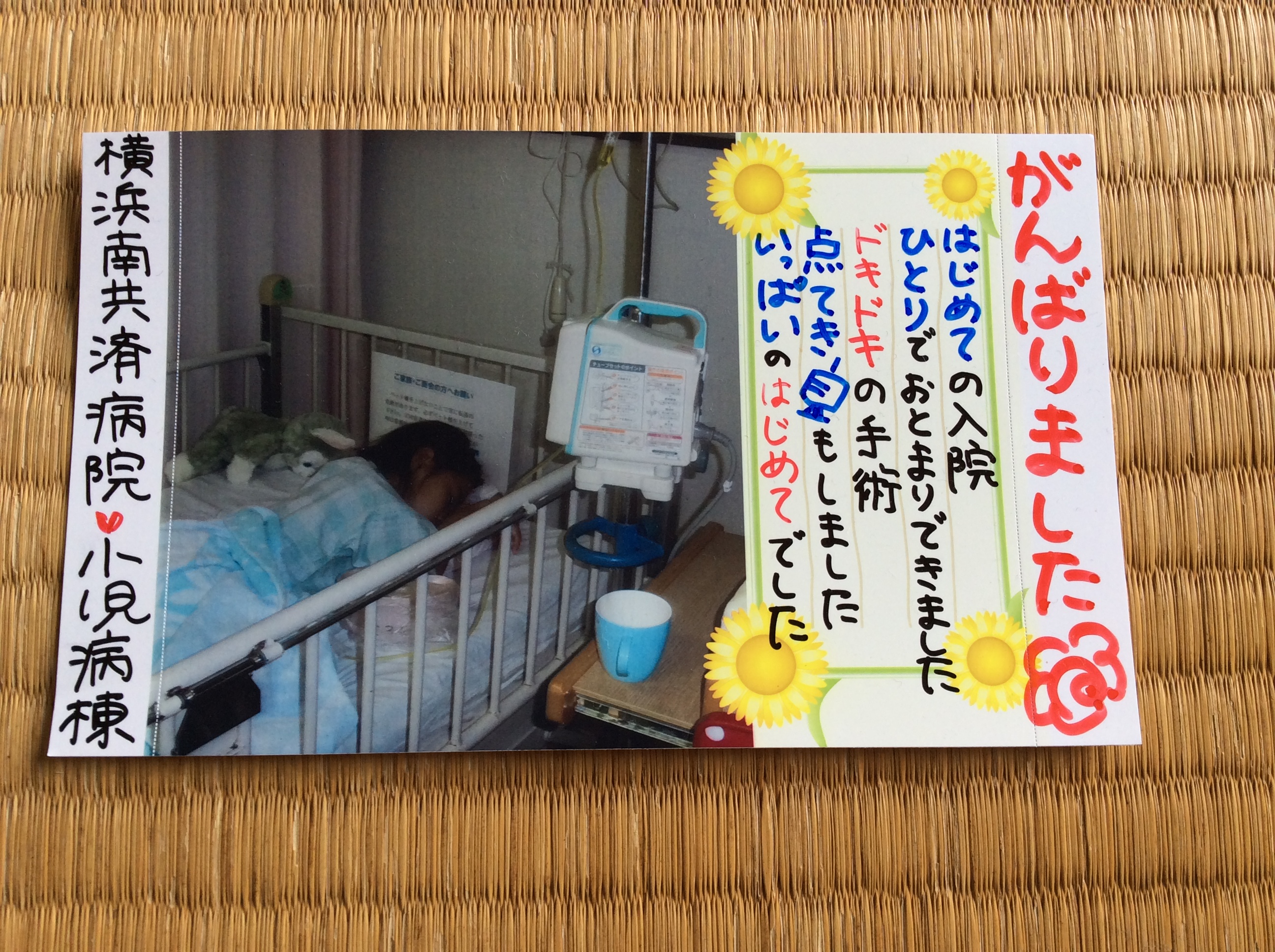 My 6 year-old daughter had her tonsils and adenoids out over summer vacation. She had been diagnosed with sleep apnea several months earlier and since nothing else was helping, finally I reluctantly agreed to the surgery.
My 6 year-old daughter had her tonsils and adenoids out over summer vacation. She had been diagnosed with sleep apnea several months earlier and since nothing else was helping, finally I reluctantly agreed to the surgery.
I was reluctant because hospital “culture” in Japan is very different from the US, where I am from, and because I knew I would be up against another cultural wall in regards to care for my older child.
This surgery, that requires a one-night stay in the hospital in either the US or UK (according to some quick research on my part,) here in Japan means seven nights in the hospital.
Since hospital rooms are shared, parents are not allowed to stay over night for any except the youngest of patients. Parents are expected to provide clean laundry and cutlery for the patient every day.
The children’s ward had a strict daily schedule, with times when they we’re confined to their beds (which literally had bars like a prison cell,) and times when, if they were well enough, they were allowed to use the playroom.
But absolutely under no circumstances whatever could they leave the children’s ward. And visitors under the age of 15 were not allowed in the ward.
This was a conundrum for me. I have a 9 year old son, who was on summer vacation at the time, and a husband who works 12 hour days, on a good day.
Hospital culture in Japan is strangely at odds with the wider culture in general. A high percentage of children co-sleep with their parents well into their elementary years. That is the cultural norm.
However, the hospital where my daughter had surgery, would not allow parents to spend the night with children over 2 years old.
This particular hospital allows parents of small children to stay until they fall asleep, but for my daughter, that may actually have been worse. Come lights out at 8pm, there was more crying in the children’s ward than from the nursery down the hall.
I had another child waiting at his friend’s house or at Baba’s (grandmother’s) house for me to come home, after all. My husband tried to get home from work at a decent hour, but I think he made it by 7pm once.
The day after the surgery, when my daughter was still feeling ill from the effects of the anesthesia and started bleeding from her nose, I was very grateful that she was in the hospital where I could have a professional attend to any concerns with the push of a nurse-call button.
Around Day 3, though, I could feel myself beginning to fall apart, fiber by fiber. The stress and plain old-fashioned exhaustion were starting to get to me.
My son at home was starting to feel the effects of being shuffled from place to place numerous times a day. My daughter wasn’t sleeping well and wanted to come home. I begged the doctor to discharge her a bit early, even a few hours would be great. His response was that the other child in the same room who’d had the same surgery on the same day was not recovering as well, and it would be upsetting for her if mine left earlier.
Excuse me, what? I thought, blinking several times, sure I had misheard. But I hadn’t.
On the day she was finally discharged, the nurses and staff presented her with a postcard, complete with a photo of her post-op, “to remember them by.” My first instinct was to burn it. Who would want to remember this? But I kept it, an ironic little reminder of the Japanese tendency to have “entrance” and “exit” ceremonies for everything.
I was reminded of a speech the principal of a junior high gave to the student body to announce that I was leaving: “People enter our lives, and at some point we must be parted. We should cherish each of these events.” Perhaps one day my daughter will value the card.
For now, she gets angry every time she sees it. The poor little girl has been waking up at night just “making sure I’m at home” for the past several weeks.
But now I look at the card and I feel profoundly thankful that my kids are, for the most part, healthy and happy. I don’t know how parents, who have to juggle (and it is a juggling with knives-type event, not harmless bean bags) a child’s hospitalization—along with the mundane tasks of everyday life that just keep coming, even when we are least able to deal with them—do it.
I say a little prayer for you every night, moms I do not know, and wish you strength and patience and space to breathe.
Has your child ever been hospitalized? What was it like for you, as a parent?
This is an original post to World Moms Blog from our mother of two in Japan, Melanie Oda.
The image used in this post is credited to the author.
If you ask Melanie Oda where she is from, she will answer "Georgia." (Unless you ask her in Japanese. Then she will say "America.") It sounds nice, and it's a one-word answer, which is what most people expect. The truth is more complex. She moved around several small towns in the south growing up. Such is life when your father is a Southern Baptist preacher of the hellfire and brimstone variety.
She came to Japan in 2000 as an assistant language teacher, and has never managed to leave. She currently resides in Yokohama, on the outskirts of Tokyo (but please don't tell anyone she described it that way! Citizens of Yokohama have a lot of pride). No one is more surprised to find her here, married to a Japanese man and with two bilingual children (aged four and seven), than herself. And possibly her mother.
You can read more about her misadventures in Asia on her blog, HamakkoMommy.
More Posts

by Mirjam | Oct 13, 2014 | 2014, Childhood, Cultural Differences, Family, Life Lesson, Netherlands, Uncategorized
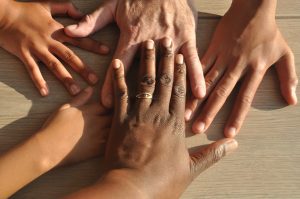 I’ve always had trouble knowing where to fit in. I have never known which box I was supposed to climb in or which label to stick on my forehead.
I’ve always had trouble knowing where to fit in. I have never known which box I was supposed to climb in or which label to stick on my forehead.
I was born in Surinam, but most of my life I have lived in the Netherlands.
My parents had a strong sense of culture and raised me accordingly.
We lived in a small town in the northern part of Holland that did not have many people of color.
Needless to say, things outside of my home were very different to things inside.
In my home there were loud voices and singing, dancing and vibrant music.
Outside of the home it felt like I needed to be ashamed of my mother’s loud voice,and I tried my best not to speak too loud.
Around my family I felt at home and liked my braids and dark skin.
Outside home, old ladies would sometimes come up to me and touch my ‘strange’ hair, and make me wish my skin wasn’t making it impossible to blend in or disappear.
There was lots of loud laughter in our home. My mother would read Anansi stories and we would laugh hysterically.
Outside of the home, I could not explain to people why any story that starts with: “Dear God, can you make everyone that laughs at someone else drop dead instantly…” is going to be a really funny one.
In Surinam culture it’s very important that children learn to respect their parents and older people. You never talk back, you never raise your voice and you always look down when you are spoken to by an adult.
At school the teacher would say: Look at me when I talk to you!
At home my parents would speak to each other and family members in Sranang tongo, their native tongue. They would speak to us in a mixture of Dutch and Surinamese, we spoke to them in Dutch. With my sisters I spoke in a mixture of Dutch and Surinamese.
At school I spoke Dutch and there were so many things I could not talk about or explain because there was no word for it in Dutch.
At birthdays, we had parties with lots of family and friends coming in from everywhere, staying for dinner and sleeping over. My mother would cook lots of food, aunts would help in the kitchen and the house was filled with all of these wonderful festive smells, and we would eat until we could eat no more.
When I was invited to a party of one of my friends, we sat in a quiet circle with mostly old family members having a polite conversation and we were given a piece of cheese with a little vlag stick (it’s a Dutch thing), everyone left before dinner and there was absolutely no music.
Growing up in these two cultures thought me how to adapt. I learned how to behave and what was expected of me in each situation. And because I was such a people pleaser, by the time I was in my teens, I could blend in anywhere and everywhere. and I knew what was expected of me. I also had lots of interest in different people.
The people I called my friends were a variety of ages, colors, cultures and mixtures and I loved every one of them.
Still, I always felt different.
I’m an adult now. I married a man whose skin color is the exact opposite of mine (no matter how much sun he gets). My children are of mixed culture. Their skin color is a mixture of ours, their hair is mixed, curly but not as curly as mine, dark but not as dark as mine.
My husband sometimes plays his (terrible) Dutch songs and I sing and dance with my children to old Surinam children’s songs. When we celebrate there’s lots of family and lots of food but no music, because my husband says he can’t have a conversation with music in the background. I teach my children to respect their parents and older people, but I also teach them that it’s okay to speak up and look people in the eye.
I mostly speak Dutch, but when emotional I turn to my native tongue, although my kids hardly understand what it is that I’m talking about.
I think here. With my own family a perfect mixture of black and white, Dutch and Surinam, east and west, I fit here.
Do you have a mixture of cultures in your family? How do you adapt?
This is an original post to World Moms Blog by Mirjam of The Netherlands.
Photo credit to the author.
Mirjam was born in warm, sunny Surinam, but raised in the cold, rainy Netherlands.
She´s the mom of three rambunctious beauties and has been married for over two decades to the love of her life.
Every day she´s challenged by combining the best and worst of two cultures at home.
She used to be an elementary school teacher but is now a stay at home Mom. In her free time she loves to pick up her photo camera.
Mirjam has had a life long battle with depression and is not afraid to talk about it.
She enjoys being a blogger, an amateur photographer, and loves being creative in many ways.
But most of all she loves live and laughter, even though sometimes she is the joke herself.
You can find Mirjam (sporadically) at her blog Apples and Roses where she blogs about her battle with depression and finding beauty in the simplest of things. You can also find Mirjam on Twitter and Instagram.
More Posts - Website
Follow Me:


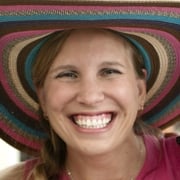
by Tina Marie Ernspiker | Oct 10, 2014 | 2014, Family, Kids, Living Abroad, Mexico, World Moms Blog, World Moms Blog Writer Interview, World Motherhood
 Where in the world do you live? And, are you from there?
Where in the world do you live? And, are you from there?
I live in Morelia, Michoacán, Mexico, which is located in the Southern mountains of Mexico. I was born in Michigan, USA in 1979 and my family moved to Kentucky, USA in 1990. I grew up in a beautiful, small, Kentucky town and didn’t move to the big city till I was married with kids. My husband and I, along with our four children moved to Mexico in 2013.
(more…)

by Susan Koh | Oct 9, 2014 | 2014, Awareness, Childhood, Domesticity, Family, Husband, Life Lesson, Marriage, Motherhood, Parenting, Relationships, Singapore, Stress, Susan Koh, Womanhood, World Motherhood, Younger Children
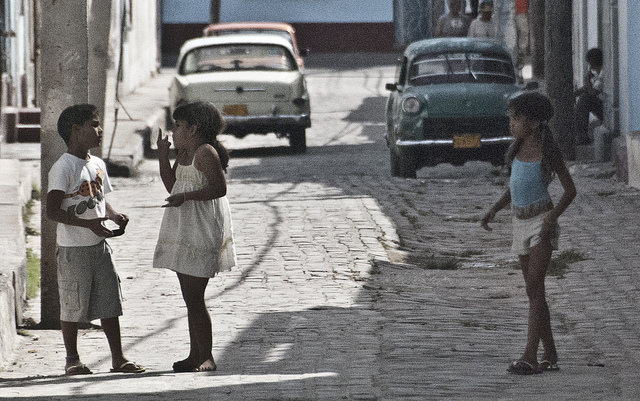 Among all the parenting rules in the book, no quarreling in front of the kids must rank pretty high up there. But, it’s the one that my husband and I have been flouting a lot lately, when our little five-year-old is around. And while we don’t choose to quarrel in full view of Sophie, arguments sometimes get over heated with voices raised and a quarrel ensnares. And when our voices rise, Sophie catches our bickering.
Among all the parenting rules in the book, no quarreling in front of the kids must rank pretty high up there. But, it’s the one that my husband and I have been flouting a lot lately, when our little five-year-old is around. And while we don’t choose to quarrel in full view of Sophie, arguments sometimes get over heated with voices raised and a quarrel ensnares. And when our voices rise, Sophie catches our bickering.
As much as we try to avoid conflict in our marriage, this is real life, where we have our failings keeping our tempers in check. As they say, familiarity breeds contempt.
I’m not proud that my daughter has to witness it, especially since she has a sensitive soul and picks up on the negative vibes quickly. And it’s even worse, when she thinks that mummy and daddy don’t love each other anymore because of our quarreling.
Last week, hubby and I had a heated arrangement over my complete lack of organizational abilities, which sent me flying into a rage because I was already halfway through packing. With more to and fro with his expectations and my explanations, neither was ready to step back or cool off. Before we knew it, there was a shouting match.
Sophie heard the commotion and came to my room and from the corner of my eye I could see her fear.
Intermittently, my little one even jumped to my defense and told daddy to stop scolding me because I was already trying my best to pack. Her words, though comforting, also felt like a sting and made me feel so guilty that she had to see the two people that she loved most in such an ugly argument. After I calmed down, hubby finally decided to help me pack as well and we both got working.
After 15 minutes little Sophie came back with a smile on her face and said:
See mummy and daddy you’re working together. You are a team now.
Those are words of gold coming from my five-year-old.
After we were done packing, we gave each other hi-fives for work well done. I even apologized for my lousy attitude to hubby and thanked him for helping, making sure that it was within Sophie’s ear-shot. I could see her beaming away.
As a mum, I sometimes forget that kids learn what they see and not what they hear. As much as we try to teach them to behave in a certain way, it’s what we model that will be a standard for them. And while quarreling in front of the kids is still a no no in my opinion, children learn that parents are also human. Parents can make mistakes but what matters is having the humility to apologize and ask for forgiveness.
At the end of the day, we are far from being perfect and can only endeavor to be better dads or mums for our kids.
This is an original post for World Moms Blog from our writer in Singapore, Susan Koh of A Juggling Mom.
The image used in this post is credited to Matt Smith and holds a Flickr Creative Commons attribution license.
Susan is from Singapore. As a full-time working mom, she's still learning to perfect the art of juggling between career and family while leading a happy and fulfilled life. She can't get by a day without coffee and swears she's no bimbo even though she likes pink and Hello Kitty. She's loves to travel and blogs passionately about parenting, marriage and relationship and leading a healthy life at A Juggling Mom.
More Posts

by ThinkSayBe | Oct 3, 2014 | 2013, 2014, Awareness, Babies, Childhood, Communication, Computers, Discipline, Education, Entertainment, Environment, Family, Girls, Kids, Life, Life Balance, Motherhood, Nature, Parenting, Technology, ThinkSayBe, Uncategorized, USA, World Moms Blog, World Motherhood, Younger Children
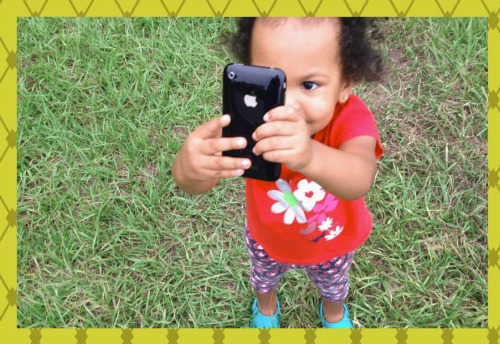 “Yes please, yes please, yes pleeeeease!” is what I hear almost every time my toddler sees or hears my phone. If she does not get it, she isn’t too happy. She may move on to playing with something else, but sometimes comes back pointing at where she last saw my phone, and says “yes please!” again. (more…)
“Yes please, yes please, yes pleeeeease!” is what I hear almost every time my toddler sees or hears my phone. If she does not get it, she isn’t too happy. She may move on to playing with something else, but sometimes comes back pointing at where she last saw my phone, and says “yes please!” again. (more…)
I am a mom amongst some other titles life has fortunately given me. I love photography & the reward of someone being really happy about a photo I took of her/him. I work, I study, I try to pay attention to life. I like writing. I don't understand many things...especially why humans treat each other & other living & inanimate things so vilely sometimes. I like to be an idealist, but when most fails, I do my best to not be a pessimist: Life itself is entirely too beautiful, amazing & inspiring to forget that it is!
More Posts
Follow Me:


 I was recently given the incredible opportunity to attend a life coaching seminar about investing in yourself. Truth be told, this wasn’t a subject that I had put any serious thought into before that day.
I was recently given the incredible opportunity to attend a life coaching seminar about investing in yourself. Truth be told, this wasn’t a subject that I had put any serious thought into before that day.









 Where in the world do you live? And, are you from there?
Where in the world do you live? And, are you from there?






 “Yes please, yes please, yes pleeeeease!” is what I hear almost every time my toddler sees or hears my phone. If she does not get it, she isn’t too happy. She may move on to playing with something else, but sometimes comes back pointing at where she last saw my phone, and says “yes please!” again.
“Yes please, yes please, yes pleeeeease!” is what I hear almost every time my toddler sees or hears my phone. If she does not get it, she isn’t too happy. She may move on to playing with something else, but sometimes comes back pointing at where she last saw my phone, and says “yes please!” again. 


